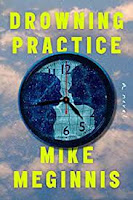I used to laugh at the idea of 'slipstream' fiction. “It's fantasy, folks.”, I was inclined to say. But with time, the idea has grown on me. It describes a very specific interstice. Far too mimetic to be fantasy yet containing a little something that just can't be reality, it's a subtle, delicate term which describes a subtle, delicate area of fiction that requires a tight hand on the wheel to keep within that specific interstice lest it all fall apart. Keeping things tight and under control is Mike MeGinnis' excellent Drowning Practice (2022).
The nexus of Drowning Practice is located in the idea that, every person, on the same night, has the same dream: the entire world will drown on November 1st. Different people react in different ways, including the three central characters: David, Lyd, and their daughter, Mott. David is a delusional secret service agent, Lyd a marginally successful novelist, and Mott the product of their collective personal issues.
The couple are separated. Lyd, having had enough of David's creepy, controlling ways, takes their daughter and leaves. On the run, she hopes to start a new life, as little as it may be before the world ends, but at least one where David cannot interfere. Mott too young to fully comprehend, does her best to be entitled and uncertain on their roadtrip. And David, true to form, uses the powers at his disposal to track them down. The novel is the story of these three psychologically troubled people and their run up to the world ending. Not psycho killers, rather they are people with emotionally misaligned notions of self and relationships, notions which lead to anything but Hallmark-brand decisions, interactions, and social life. The bounce of atoms within these walls as they careen toward apocalypse is the engine of the novel.
Drowning Practice is a sublimely dark novel. While the pending apocalypse adds shadow, the overwhelming majority of discomfort the reader feels is in the psychologies of the main characters. One a narcissist, one a weak pacifist with minimal barriers, and the third the child of such dysfunction, the reader routinely encounters situations wherein they mentally shout at the characters. “Get the fuck out of here!”, “Stand up for yourself!”, and “Look at what you're doing to your daughter!”.
And while the characters' situations are individual, it's possible that Meginnis also intended the people to be representative of growing proportions in the Western world. Functioning nuclear families are on the decline, and broken, semi-functional to dysfunctional families like Mott's are on the incline, leading to, you guessed it, increased social disharmony. Secondary characters' reactions to the impending apocalypse provide a glimpse of this
I imagine genre reviewers are wont to put Drowning Practice on the apocalyptic fiction shelf. I would disagree. An apocalypse is certainly a device the novel utilizes, but the focus is entirely on the characters and their behavior. The apocalypse is just the spurs in the family's lives. In fact, the vast majority of the novel is found in quotidian life—at least what passes for quotidian in the lives of people doing their best with the limited emotional tools at their disposal.
Of the +/-12 books I've read published in 2022 thus far, Drowning Practice is my novel of the year. Things may change, but the manner in which Meginnis portrays both the sense of doom presented by mainstream and social media as well as the multitude of personal, psychological issues which reveal themselves in our modern, less social, technology-integrated, and increasingly isolated of Western life, is on point. Meginnis gives the reader a glimmer of light at the end of the tunnel, but what comes before feels reflective of the current state of Western society. But Jesse, the reader says, it's not normal that people have security cameras monitoring their loved ones. How can you say it is representative? And I think it's at this point that the term slipstream reveals its value as a literary tool. Not quite real enough to be realist, and yet still entirely grounded in everyday Western life, Meginnis successfully plays the fragile game of balancing imagination with reality. The security cameras are symbolic.
Accordingly, Drowning Practice will not be for the average genre reader. Despite the fantastical premise, Meginnis focuses his energy on the internal lives of his three main characters. Readers who appreciate the role learned behaviors, emotions, and relationship struggles play in stories will find a gold mine. How this all reflects on modern society is up to the reader to determine, but for this reader the analog rings true, making it a great novel for 2022. (P.s. Meginnis does not get political—just in case you were worried.)


As I don't get mail notifications anymore, imagine my surprise that when I checked back here after a couple of weeks, I find reviews of three books that I might have to read - this, Glitterati and Venomous Lumpsucker. Thanks for digging these titles up out of the contemporary muck!
ReplyDelete:) You're welcome. There is one more 2022 recommendation (likely) coming. I haven't finished it yet, but Ray Nayler's The Mountain in the Sea is shaping up to be another winner. And for you, it is a cli-fi novel with the same feel as Stephenson's Termination Shock or Beauman's Venomous Lumpsucker.
Delete